 W
WEndre Ady was a turn-of-the-century Hungarian poet and journalist. Regarded by many as the greatest Hungarian poet of the 20th century, he was noted for his steadfast belief in social progress and development and for his poetry's exploration of fundamental questions of the modern European experience: love, temporality, faith, individuality, and patriotism.
 W
WJános Arany was a Hungarian poet, writer, translator and journalist. He is often said to be the "Shakespeare of ballads" – he wrote more than 102 ballads that have been translated into over 50 languages, as well as the Toldi trilogy.
 W
WImre Augustich or Agostich was a Slovene writer, poet, journalist, and representative of Vas county in the National Assembly of Hungary. He was the author of Prijátel (Friend), the first newspaper in Prekmurje Slovene.
 W
WJózsef Bajza was a Hungarian poet and critic.
 W
WBaron Béla Bánhidy de Simánd was a Hungarian politician and Member of Parliament.
 W
WJános Batsányi was a Hungarian poet.
 W
WFerenc Xaver Berke de Nagybarkóc was a Hungarian Slovene Lutheran pastor and writer.
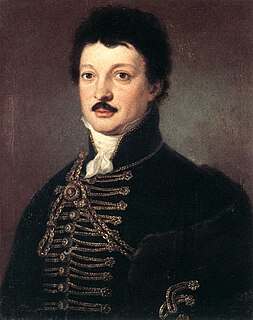 W
WDániel Berzsenyi was a Hungarian poet.
 W
WGergely Csiky was a Hungarian dramatist.
 W
WAlajos Degré was Hungarian lawyer, legal historian, author and one of the key figures of the Hungarian Revolution of 1848.
 W
WCount Aurél Dessewffy de Csernek et Tarkeő, Hungarian journalist and politician, eldest son of Count József Dessewffy and Eleonóra Sztáray, was born at Nagymihály, Zemplén County, Austria-Hungarian Empire.
 W
WBaron Lajos Dóczi, aka Dóczy was a Jewish Hungarian poet, journalist. His father, Adolf Dux, was a wine trader, and is not to be confused with the writer of the same name, Adolf Dux.
 W
WAdolf Dux was a Hungarian Jewish writer and journalist.
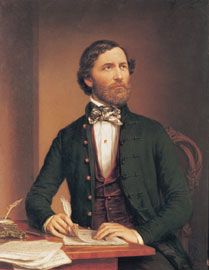 W
WBéni Egressy was a Hungarian composer, librettist, translator and actor. He created a number of popular melodic compositions, including the one to Mihály Vörösmarty's patriotic poem Szózat. He also authored the librettos of the operas Hunyadi László and Bánk bán by Ferenc Erkel.
 W
WJános Erdélyi was a Hungarian poet, critic, author, philosopher and ethnographist.
 W
WJános Garay was a Hungarian poet and author, was born in Szekszárd, Tolna County. From 1823 to 1828 he studied at Pécs, and subsequently, in 1829, at the University of Pest. In 1834 he brought out an heroic poem, in hexameters, under the title Csatár. Garay was an energetic journalist, and in 1838 he moved to Bratislava, where he edited the political journal Hírnök (Herald). He returned to Pest in 1839, when he was elected a corresponding member of the Hungarian Academy of Sciences. In 1842 he was admitted into the Kisfaludy Society, of which he became second secretary.
 W
WMichal Miloslav Hodža was a Slovak national revivalist, Protestant priest, poet, linguist, and representative of the Slovak national movement in 1840s as a member of "the trinity" Štúr-Hurban-Hodža. Michal Miloslav Hodža is also the uncle of the Czechoslovak politician Milan Hodža.
 W
WGyula Hornyánszky, was a Hungarian classical scholar and member of the Hungarian Academy of Sciences.
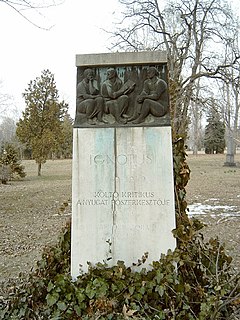 W
WHugó Veigelsberg was a noted Hungarian editor and writer who usually published under the pen name Ignotus. He was distinguished for the lyric individuality of his poems, stories, and sociological works. In addition to "Ignotus", he also wrote under the pseudonyms "Dixi," "Pató Pál," and "Tar Lorincz".
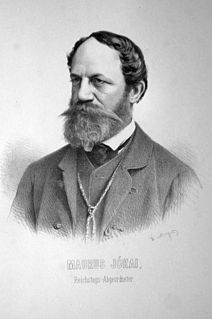 W
WMóric Jókay de Ásva, outside Hungary also known as Maurus Jokai or Mauritius Jókai, was a Hungarian nobleman, novelist, dramatist and revolutionary. He was active participant and a leading personality in the outbreak of Hungarian Liberal Revolution of 1848 in Pest. Jókai's romantic novels became very popular among the elite of Victorian era England; he was often compared to Dickens in the 19th century British press. One of his most famous fans and admirers was Queen Victoria herself.
 W
WGyula Juhász was a Hungarian poet, who was awarded the Baumgarten Prize.
 W
WJózsef Katona was a Hungarian playwright and poet, creator of the Hungarian historical tragedy Bánk bán.
 W
WFerenc Kazinczy was a Hungarian author, poet, translator, neologist, the most indefatigable agent in the regeneration of the Hungarian language and literature at the turn of the 19th century. Today his name is connected with the extensive Language Reform of the 19th century, when thousands of words were coined or revived, enabling the Hungarian language to keep up with scientific progress and become an official language of the nation in 1844. For his linguistic and literary works he is regarded as one of the cultural founders of the Hungarian Reform Era along with Dávid Baróti Szabó, Ferenc Verseghy, György Bessenyei, Mátyás Rát and János Kis.
 W
WSándor Kisfaludy was a Hungarian lyric poet, Himfy's Loves his chief work, was less distinguished as a dramatist. He is considered to be the first romantic poet from Hungary. He was the brother of Károly Kisfaludy. He has been set to music by Zoltán Kodály.
 W
WJózsef Kiss was a Hungarian poet and editor.
 W
WFerenc Kölcsey was a Hungarian poet, literary critic, orator, and politician, noted for his support of the liberal current in Hungary regarding the politics involving the Austrian Empire. He wrote Himnusz, the national anthem of Hungary in 1823.
 W
WLajos Kossuth de Udvard et Kossuthfalva was a Hungarian nobleman, lawyer, journalist, politician, statesman and Governor-President of the Kingdom of Hungary during the revolution of 1848–49.
 W
WMoriz Ludassy, aka M. Gans von Lúdassy was a Hungarian journalist.
 W
WImre Madách de Sztregova et Kelecsény was a Hungarian aristocrat, writer, poet, lawyer and politician. His major work is The Tragedy of Man. It is a dramatic poem approximately 4000 lines long, which elaborates on ideas comparable to Goethe's Faust. The author was encouraged and advised by János Arany, one of the most famous of the 19th-century Hungarian poets.
 W
WKálmán Mikszáth de Kiscsoltó was a widely reputed Hungarian novelist, journalist, and politician. His work remains in print in Hungarian and still appears sporadically in other languages.
 W
WSándor Petőfi was a Hungarian poet and liberal revolutionary. He is considered Hungary's national poet, and was one of the key figures of the Hungarian Revolution of 1848. He is the author of the Nemzeti dal, which is said to have inspired the revolution in the Kingdom of Hungary that grew into a war for independence from the Austrian Empire. It is most likely that he died in the Battle of Segesvár, one of the last battles of the war.
 W
WJohann Ladislaus Pyrker (von Felsö-Eör) was a Hungarian Cistercian abbot, archbishop and poet.
 W
WAugust Karl Silberstein was an Austrian writer, born in Ofen, Budapest (Hungary). Silberstein was educated at the University of Vienna and supported the 1848 revolts in Austria-Hungary with his articles in the German satire periodical Leuchtkugeln, which was banned in the middle of 1851. As a result, Silberstein was forced to leave his home.
 W
WBertalan Szemere (1812–1869) was a Hungarian poet and nationalist who became the third Prime Minister of Hungary during the short period of the Hungarian Revolution of 1848 when Hungary was independent of rule by the Austrian Empire.
 W
WDezső Szomory was a Hungarian Jewish writer and dramatist. In his history plays and other works, he developed a unique tone and style of Budapest Hungarian; his work has been compared to that of Marcel Proust. He died during the Holocaust while living under Swedish protection in Budapest, suffering "starvation, loneliness, and depression".
 W
WKálmán Thaly was a Hungarian poet, historian and politician. His most important works are his Kuruc poetry, the most famous literary forgery in the history of Hungarian literature.
 W
WMihály Tompa, was a Hungarian lyric poet, Calvinist minister and corresponding member of the Hungarian Academy of Sciences. Together with János Arany and Sándor Petőfi they formed the triumvirate of young great poets of the Hungarian folk-national literature of the 19th century.
 W
WKálmán Tóth (1831–1881) was a Hungarian poet. He was born in Baja. The main theme of his poetry was love.
 W
WJános Vajda was a Hungarian poet and journalist. His first poetry was published to the public in Életképek in 1844. He was a member of the Kisfaludy Society.
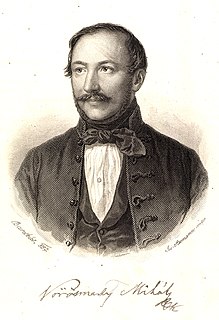 W
WMihály Vörösmarty was an important Hungarian poet and dramatist.